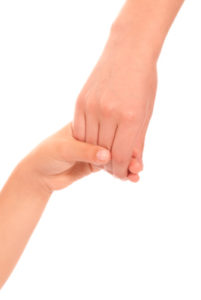The power of touch is profound in romantic relationships. Touch serves a multitude of functions right from the moment of birth. The sensation of skin on skin offers a feeling of safety, security, and calmness that lets you just be, take everything in and grow without having to use up your attention span and emotional energy on trying to survive. The power of touch is experienced when the vagus nerve (part of the parasympathetic nervous system) downregulates the entire nervous system so that you don’t need to prepare for fight, flight, or freeze – offering safety and security. In other words threats to survival are low and you can focus on connection, trust, and intimacy – just what a romantic couple want and need.
The power of touch – when it’s given or withheld as a management tool in a relationship
Michelle, a 36-year-old social media influencer in the baby-wear industry craved hugs from her husband Colin a 38-year-old acupuncturist. She got jealous when Colin hugged the kids and their dog, wishing she could be one of them. She longed for Colin to put his arm around her when they went to the movies, or when they were watching a show at home. Yes, he snuggled her in bed, but that felt more like a ritual they observed before falling off to sleep.
She might as well have been a stuffed animal toy to Colin, whereas her actual need was for being enclosed in his arms to mimic the warmth and comfort of the womb. Michelle often turned her back on him in bed hoping to evoke a desire in her husband to reach out for her, to feel her skin, to smell her smell and to relax within that embrace.
Unfortunately it turned out to be a double whammy. Colin was annoyed that his efforts weren’t being received and wondered why he bothered. Michelle lost out on what she ached for by not only depriving herself in the moment she turned her back on the embrace, but made sure she was less likely to get the offer in the future!
These type of interactions are typical of individuals who have insecure attachment styles, and find it hard to maintain a state of emotional equilibrium.
The power of touch and the swaddling effect
When Michelle was anxious about not getting enough hits on her social media platform, or another influencer taking over her ratings spot, she wanted Colin to give her a big hug and hold her for a while, until she felt ready to try again. She wanted the equivalent of the swaddling effect offered to an infant wrapped in a blanket after birth – that vital sense of being bound on all sides – of security that despite this blow, she will survive and that Colin wants her to survive.
The feeling of touch, enclosed in his arms, his heart-beat slowing down her-heart beat as their chests rested against each other, would have provided the down regulation of the overactive sympathetic nervous system, reacting to the threat of the on-line competition. The power of touch she yearned for was an essential part of stabilizing a hypervigilant nervous system that prevented her from thinking straight, and using good judgement to plan her response.
But Colin had no clue. He had no idea how important hugs from him were when Michelle was anxious and discombobulated. When she complained about it, he remembered previous times he had offered and been rejected, and would act to protect himself from further rejection. Other times he wanted to prove he was playing his part, making the effort later on, but out of duty. She didn’t see it as genuine and in this instance lost the chance to gain from the power of touch.
So each one used the power of touch to feel powerful in declining it when offered or refusing to offer it after being rejected.
Colin too needed touch, and got it playing with the kids – in rough and tumble, putting them to bed, and lying next to them watching the stars at night. He derived a sense of acceptance and tolerance, speaking a language of love that allowed him to be himself and wanted at the same time. He didn’t feel that same power of touch with Michelle. Rather he experienced her as demanding and forcing him into a role that stifled his self-identity. So he was loath to use the pleasures of touch he got with his kids, to take care of Michellle. The couple relationship therefore lacked trust, safety, and intimacy – hallmarks of insecure attachment styles.
The power of touch makes romantic couples stronger and more resilient
The power of touch in romantic relationships is outlined in the Personality and Social Psychology Bulletin, (2020). The research found that couples who reported having touched and been touched by their partners had more emotional connection, more positive feelings, and greater intimacy in their romantic relationships. The positive effects of the touch lingered and were still evident 6 months later. The authors concluded that touch between romantic partners served to strengthen bonds and make the pair psychologically stronger and more resilient as a couple.
The negative interpersonal interactions that Michelle and Colin conducted, typified by insecure attachment styles, prevented them from the benefits that the research described.
The power of touch between couples signifies belonging
You’ve probably noticed that some couples stand close together in public, with their shoulders or hands close in contact, touching one another often, with or without eye contact. It’s a sign that says ‘this is mine’ and “I get to play around with it.’ The power of touch in social situations conveys familiarity, and intimacy that is exclusive, conveying a strong sense of belonging. It tells the group that the pair belong to one and other, and do so by ‘claiming’ each other with touch – signifying an exclusive bond, which provides a sense of security when the threat of so many other potential rivals are about.
Michelle didn’t like to go out on her own to mix with known or new social groups. But when she went with Colin, and he had his arm on her, it made her feel like he was telling the world, she was his chosen one, a worthy prize that no one else could have. Unfortunately, the burden on Colin was unsustainable. He felt used by having to prove his love in this way, and rarely put his arm around her. Michelle’s experience was so negative that she offloaded onto him when they got home, furthering the likelihood of Colin being unattracted to hugs and caressing – another typical feature of insecure attachment styles.
The power of touch in reducing pain in a romantic partner
Several studies have demonstrated the power of touch in reducing pain, anxiety, and distress. In 2019 the ICHT, an organization for Complementary Medicine compiled a review of the literature on the power of touch in anxiety reduction. They found a wealth of evidence demonstrating that using therapeutic touch eased the anxiety of patients diagnosed with chronic diseases like high blood pressure, anxiety, and depression among others. In 2020 a study in Brazil showed that touching reduced physical pain, relieved depression and promoted sleep quality in injured patients.
In order to benefit from the power of touch to lower her anxiety and enhance her restless sleep, Michelle had developed a sure fire way of having her longing for touch fulfilled, and justifiably so. She had frequent falls and or accidents around the house that made Colin super scared, and only too willing to lie by her side, body-to-body, stroking her hair, her hands, or her legs – wherever she ached. The power of touch worked it’s magic in soothing both of them – the pair of them were downregulated by the calming effects of the activated vagus nerve. Both often fell asleep holding each other in exactly the ways Michelle had yearned for before her injury.
Michelle’s pain was relieved with the touch and stroking, and Colin’s panic was reduced by feeling her response to his rescue efforts. In fact an article in Neuroscience & Biobehavioral Reviews 2021 suggests a mutual feedback-loop among several brain networks in both people that work to influence “inter-brain” coupling between partners in alleviating distress and promoting empathy that plays a key role in mutual comforting. Michelle became more receptive to receiving touching care from Colin because she sensed genuine fear for her in his demeanor, and, because she responded, he felt rewarded and continued.
Unfortunately crises built on threat to life and limb became the only pattern whereby they allowed some level of safe intimacy to live in their relationship – an additonal feature of insecure attachments evolved to avoid the shame of feeling needy.
The power of touch in reducing stress in romantic couples
Michelle and Colin both experienced stress at different times and for different reasons. Colin’s stress rose when his acupuncture practice had low turnover, and when he felt unappreciated by Michelle. Her stress flowed around fear of the kids growing up and not needing her, or when she felt devalued by a family member.
What does the research say about the power of touch in reducing stress in couples?
The power of touch in reducing the level of stress hormones circulating in the body is well known, such as in the use of massage. But a more interesting study reported in Psychoneuroendochronology, 2007, showed that women who had good partner relationships were more likely to benefit from touch and social support. Just offering verbal support, like saying ‘everything will be okay’ had no effect. Nor did just offering social support like taking a load off their plate. It was the power of touch from a partner that made the difference. While partners with good relationships had the most benefit, the power of touch still managed to lower the levels of adrenaline and cytokines in the blood, which are markers of stress in couples with more negatively toned interactions.
Often Michelle is in a state of terror when she imagines bad things are going to happen to her if she falls, becomes bedridden, gets terminally ill, or that she will be a single mother if Colin dies (a common type of fear in insecure attachment styles). The journal of Psychological Science, 2014, showed that interpersonal touch between partners was particularly beneficial especially for those who experience terror states, compounded with low self-esteem like Michelle.
When Michelle and Colin are not aggrieved by one and other, they could both benefit from the power of touch to help each other destress, feeling more intimate in the process. One way they can do this is by offering scalp massages. In 2016, the Journal of Physical Therapy reported on a study where the stress hormones were significantly reduced by the application of scalp massages. Michelle and Colin could do this on the couch where one puts their head on the other’s lap and receives a scalp massage when they are stressed out.
The power of touch in managing anxiety and loneliness
Colin was anxious about not being a good enough husband because Michelle rarely responded to his efforts to make her feel more secure. Michelle lived in a semi-permanent state of anxiety because she longed to be special, and swaddled and safe in an uncertain and often hostile world (significant markers of insecure attachment styles). Both needed to be soothed and comforted by one another. The power of touch is key in downregulating both of their jacked up nervous systems due to emotional and attachment insecurity.
But how are they to care for one-and-other through the power of touch when they use it as a tool of punishment, or don’t accept it as a genuine response unless there is a crisis?
One way is to self-soothe by using the power of touch to rub, stroke and or hug oneself and invite the other to join you. Making it a joint effort has been shown to enhance the feeling of self-value, and social identity – making both Michelle and Colin feel more important and valued in each other’s eyes. A study in 2021, reported in Compr.Psychoneuroendocrinol showed that a combination of self-soothing touch and being hugged can lessen the unsettling and destabilizing effects of social identity problems, such as where you fit in and what roles you play (features of insecure attachment styles).
Another study in Adaptive Behavior and Human Physiology, 2020 described the efficacies of the power of a touch when feeling isolated and or lonely. Getting a hug or being held by one’s partner significantly reduced heart rate, and loneliness. Michelle and Colin feel lonely when they are in their own silos, feeling rejected and inadequate. Instead of resorting to crisis and physical accidents, just holding out a hand and inviting their spouse for embraces for no particular reason can help keep up their sense of belonging, being seen, attended to, and valued. In turn both their nervous systems will downregulate and they will be ripe for intimacy that is spontaneous.
The journal Nature Human Behavior, 2024, conducted a review of all the research available at the time on the power of touch to help emotional and mental health suffering. They reported that touch was “especially effective” in reducing stress hormones, pain, feelings of depression and anxiety whether situational or part of a person’s mental health challenge.
Michelle and Colin experience good feelings and comfort when engaged in touching and playing with their children. But so far, they have not found the recipe for using the power of touch in helping them manage their respective stress, anxiety, pain, and sense of devaluation in their marital relationship.
The power of touch can be harnessed and promote safety, trust, and intimacy if they started from the basics:
Washing each other’s’ hair
Foot massages on the couch
Back rubs after going on a walk, bike ride, or other sporting activity
Putting a gentle hand on the shoulder to let them know you are there
Giving each other a hug while preparing for an event
Playing tag where touch is important
Touching and holding while swimming
Rough and Tumble play where they wrestle each other in fun
These spontaneous touching experiences have no in-built demands, regimens, or protocols. Therefore the likelihood of evaluating it for sincerity or purpose is miniscule. The positive physiological effects of touch can open up channels for intimacy that are not prescribed and loaded with expectations set up to fail.
Copyright, Jeanette Raymond, Ph.D. 2024
You may also like:
Dealing with Loneliness in a Marriage





